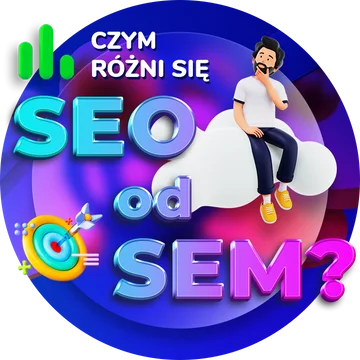Table of contents
If you work in the digital marketing space, it’s helpful to know the difference between SEO and SEM. Search Engine Optimization (SEO) and Search Engine Marketing (SEM) are two terms that are often used imprecisely. In fact, these terms from the digital marketing community are not the same. So let’s see what distinguishes SEO from SEM.

What is SEO?
Search Engine Optimization, or SEO, is the process of improving the organic visibility of a website or web page on search engine results pages (SERPs). This can be achieved by optimizing a site’s content, structure and on-page elements such as titles, metatags and anchor texts (internal linking) or optimizing content structure. Off-site activities along with linkbuilding are also considered an element of SEO. You can read about exactly what affects SEO in a separate post. In Poland, the term website positioning is also often used.
The goal of SEO is to attract organic traffic from search engines such as Google, Bing and Yahoo. The idea is to improve the visibility of a website in the free search results.
The aim is to improve the visibility of a website in the free search results.
What is SEM?
SEM literally means search engine marketing. Search Engine Marketing is therefore a broader term that includes SEO. The second component of SEM is PPC advertising (Pay-Per-Click).
SEM thus includes paid and free traffic from search engines. In short, SEM=SEO+PPC.
Note: Often colloquially, the term SEM is sometimes used synonymously with PPC. In fact, PPC is one of the two elements that make up search engine marketing.
What is PPC?
PPC is a form of online advertising in which advertisers can display their ads on search engine results pages. Advertisers pay every time their ad is clicked on by a user. The effect is quick and direct. The goal of PPC is to generate paid traffic to the site and further drive the user to conversion.
SEO versus PPC
The goals of PPC and SEO are similar. In both cases, the goal is customer acquisition, and the source of user acquisition is search engines.
However, there are a few key differences between SEO and PPC that should be kept in mind. First, SEO results last longer than PPC results. With paid campaigns, turning them off results in an immediate loss of traffic. With PPC, you can influence traffic directly, while with SEO you have to wait until your content is discovered and appreciated by Google, gaining ranking positions.
>
SEO is a more complicated process in which the results depend on a third party (Google search engine). Additionally, conversion rates are different for both types of traffic – organic traffic from SEO has a higher conversion rate than PPC traffic. Ultimately, the customer profile from the two media is different.
Conclusions
So what is the difference between SEO and SEM? In a nutshell, SEO is the process of optimizing a website or web page to rank higher in the unpaid search engine results pages (SERPs). SEM includes both SEO and PPC – paid traffic from search engines. PPC is a form of online advertising in which advertisers pay each time their ad is clicked on by a user.
Was the article helpful?
Rate our article, it means a lot to us!
Let's talk!
Hello! My name is Piotr Starzynski and it's a pleasure to meet you in the SEO industry. I have been officially working in SEO since 2006, while I have been working in analytics for several years. I have about 400 analytics implementations for client websites, hundreds of SEO projects and dozens of analytics projects for mobile applications. At Up&More, I am responsible for the Search Engine Optimization and Web Analytics team. If you feel like working with me, I invite you to contact me!